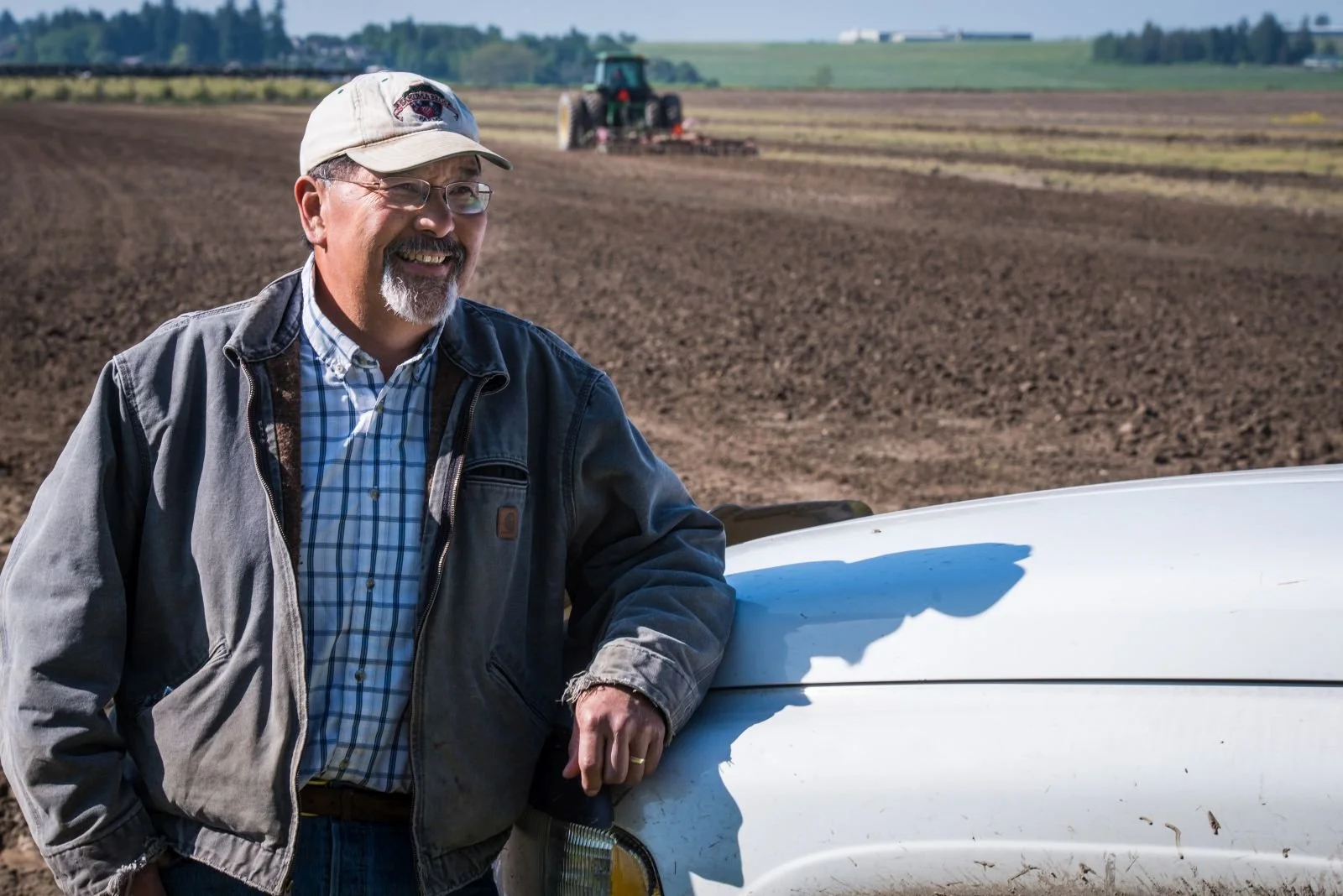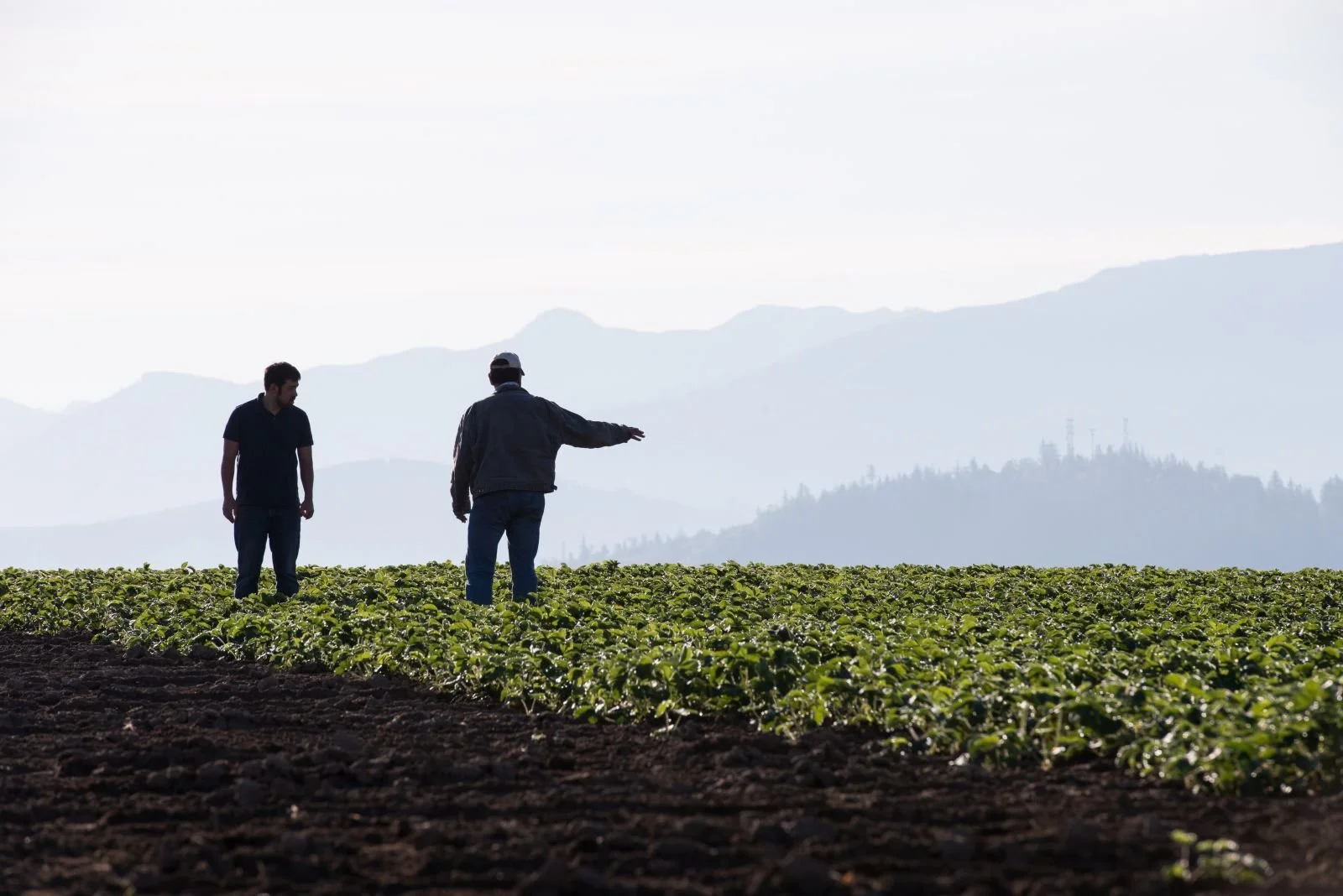Sakuma Brothers: Making room for new generations
The story of Skagit County’s largest berry grower and one of its largest multi-generational farm families starts with two people and one plant: the strawberry.
The first two generations, July 15, 1939
Takeo Sakuma began raising strawberries on Bainbridge Island in 1907. When a berry processor suggested his family try Skagit County, Takeo and his wife Nobu sent their oldest son Atsusa “Tuse” Sakuma to Burlington in the 1930s. Three more brothers followed, and Sakuma Brothers Farm was established.
First-generation Japanese immigrant farmers, among Washington’s earliest commercial berry growers, faced many obstacles. Not allowed to purchase property, Takeo first rented his Bainbridge Island land. Encouraged by the R.D. Bodle Packing Plant, which hoped the Sakumas would build on their success, they expanded their operations to the Skagit Valley.
Succeed they did, but following the attack on Pearl Harbor on December 7, 1941, the 14,565 Japanese and Japanese American residents of Washington were forcibly removed and sent to internment camps. When the war ended, the Sakumas—including six sons who served in the 442nd Infantry Regiment of the Military Intelligence Service (MIS)—reunited in Burlington.
Their land and belongings on Bainbridge were gone. Their Burlington acreage was intact, thanks to neighbor Oscar Mapes, who had paid the taxes and tended the crops during their absence.
The six second-generation “uncles” set to work rebuilding and expanding the company.
Leaving for Manzanar
“The uncles did carpentry, plumbing, built things, took care of the crew, and farmed,” says former Farm president Richard Sakuma, who has retired but continues to work part-time on projects and serve on the board. “My dad Akira was in the field, Nathan’s grampa Sat was in the office, and Tuse was all around.
“They didn’t always see eye to eye, but they just kept going.”
Grace Sakuma during the 1950 harvest
As Sakuma Brothers grew, so did the family. The eight second-generation Sakuma brothers and two sisters had 30 children. Today, that third generation is recruiting board members and managers from the 40-member fourth generation.
Who will take over a farm, and when, is a thorny question for many farm families. One reason the Sakumas are still in business and still speaking is that everyone spent summers working together on the farm in Burlington or at the family’s Norcal Nursery in Redding, California until it closed in 2017.
“If your last name was Sakuma, you did whatever you were told,” remembers Richard. “I can’t say they had a pleasant experience on the farm but they learned everything.”
In the 1970s, the second-generation uncles turned the reins over to generation three. Brothers Bryan and Glenn managed the Washington operations with cousin Richard. Cousins Ron and John managed Norcal Nursery. When Steve Sakuma retired as a U.S. Army Colonel in 1996, he returned to the family farm as chief executive officer.
Most of the family continued to work summers—along with most of the county. In the 1970s, a thousand workers helped pick more than a thousand acres of berries. “The whole valley was into it,” says Tami Sakuma, Richard’s wife. At the peak, 16 buses picked up teens and college students as far south as Mountlake Terrace, as far west as Oak Harbor and Anacortes, and upriver to Sedro Woolley.
Then the last local berry processor, National Canning Company, closed its Burlington plant abruptly in the late 1980s.
This was a blow. Commercial fruit and vegetable processors were important sources of income to Skagit farmers. They could sell their crops for a good price to the processor, who would freeze or can the fruit and then sell it into wholesale and retail channels. No fruit processor left only the regional fresh market, too small to sustain more than 30 local berry growers.
Planting raspberries, 1976
Instead of raising the crop and driving it to town, where someone else took it out of their hands, the Sakumas took on a steep new learning curve. They erected a processing building, bought the processing company’s flats and equipment, and mastered a new body of knowledge in just a few years. Under Bryan Sakuma’s leadership as the processing company president, the family of growers and pickers succeeded in the fruit processing business, too.
Sakuma Brothers continues to grow strawberries, raspberries, and blackberries, and custom-grows blueberries for some of the largest fresh fruit marketers in the world. They process and freeze their own berries for export markets and premium ice cream brands, as well as berries from other regional farmers.
Never one to put all its eggs in one basket, the Sakuma family has continued to look for new opportunities. Richard played a key role in berry trials with universities, helping to introduce ever-bearing Albion strawberries to local markets; today, they are the leading fresh-market strawberry variety in the valley. At one point, the family farmed significant acreage of apples and continues to experiment with growing tea. All the while, Bryan has continued seeking expanded market access and pursuing new projects in all marketing areas.
Richard Sakuma, photo by Clint Easley
In the 2000s the family added the Sakuma Marketstand, a seasonal direct retail stand on Cook Road. The remaining second-generation Sakuma brothers weren’t sure about it. “We put our name on a sign for the first time,” remembers Richard—a huge step for a low-profile family. “Even today our fresh market label doesn’t say Sakuma. The uncles stood out there with their hands in their pockets looking at the sign, and the only thing they said was, ‘it’s too big!’”
For several decades, the uncles had a lot to say to the third generation—especially the youngest uncle, who “would pick up mail, drive around and tell the boys what they were doing wrong,” says Richard’s wife, Tami.
When Richard and other third-generation managers began looking for talent in the fourth generation, they thought intentionally about that criticism, and how they might create a farm and company culture in which institutional knowledge could be passed along while new voices were heard.
Nathan and Richard Sakuma, photo by Clint Easley
Now, they expect potential younger generation managers to have 10 years of work experience outside Sakuma Brothers. “You don’t realize that other people take all these vacations in the summer,” laughs Nathan Sakuma, who started in the field, spent 15 years in berry marketing before coming back to the farm, and was promoted to president in 2025.
Another secret to their success? They make sure family and non-family management meets weekly for dialogue and discussion. The goal is “to keep the important information pertinent and flowing,” says Richard, and avoid having people make mistakes that earlier generations made.
“It’s as if you have your best chocolate chip cookie recipe and someone says ‘I’m gonna cut the sugar down,’” he explains. “Well, you could, but will everyone still like it? So you share that they can change the baking soda or flour but do not screw with the sugar, because I’ve tried that and here’s what happened.”
It seems to be working. Six of today’s owners are from the third generation. Ryan Sakuma is the first from the fourth. He started as a picker, and progressed to forklift driver, and today has a management role in operations. Among non-owner Sakumas, Nathan’s brother Noel has joined the farm as a farm manager, and first-cousin Abigail is joining the business this spring as sales operations manager.
“In a family farm and business, it’s pretty easy for one small thing to snowball and fracture a family,” says Nathan, who keeps his grandfather’s vintage adding machine on his desk.
“We are committed to not letting that happen.”
Story by Anne Basye: info@skagitonians.org






